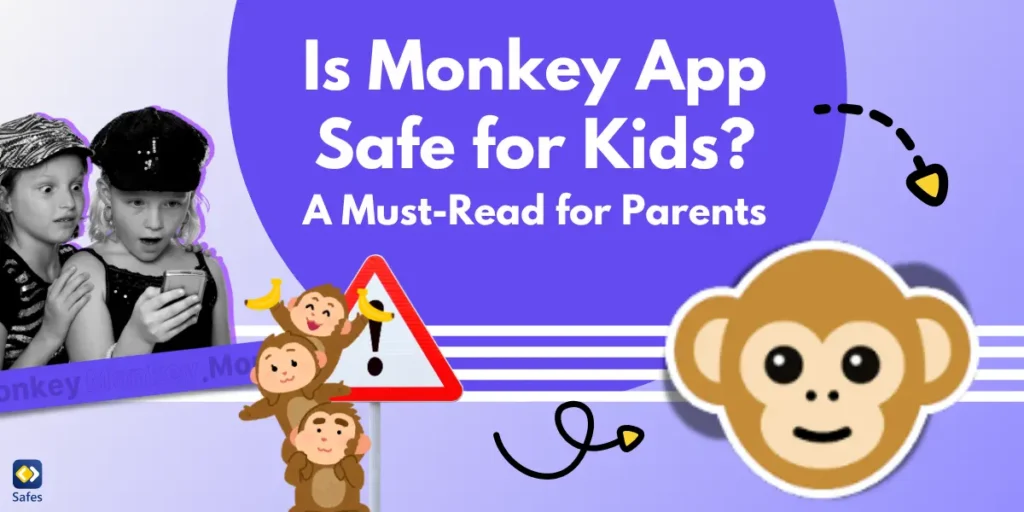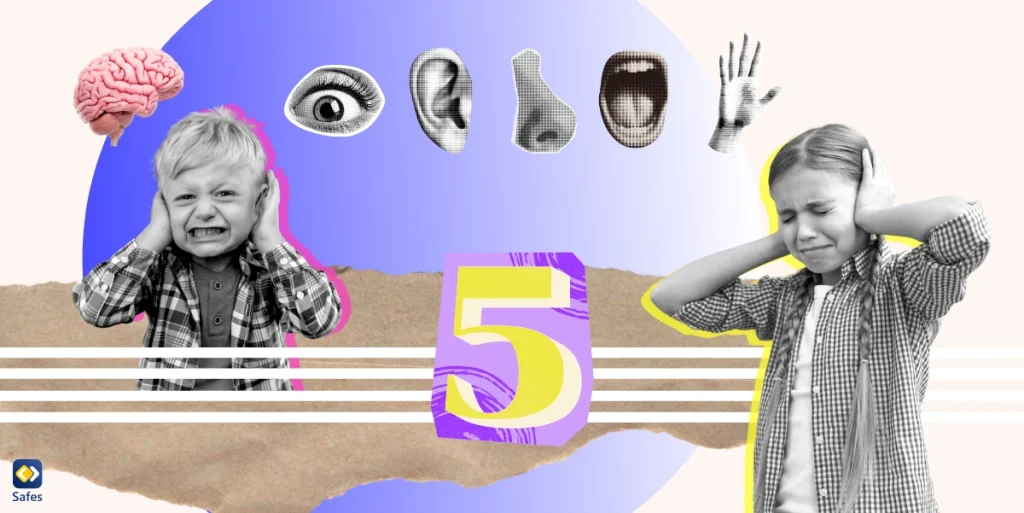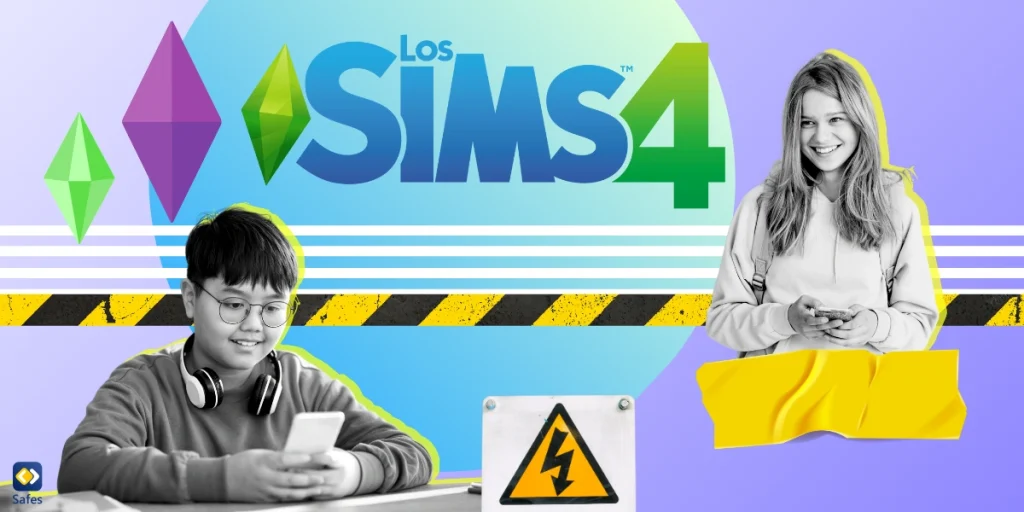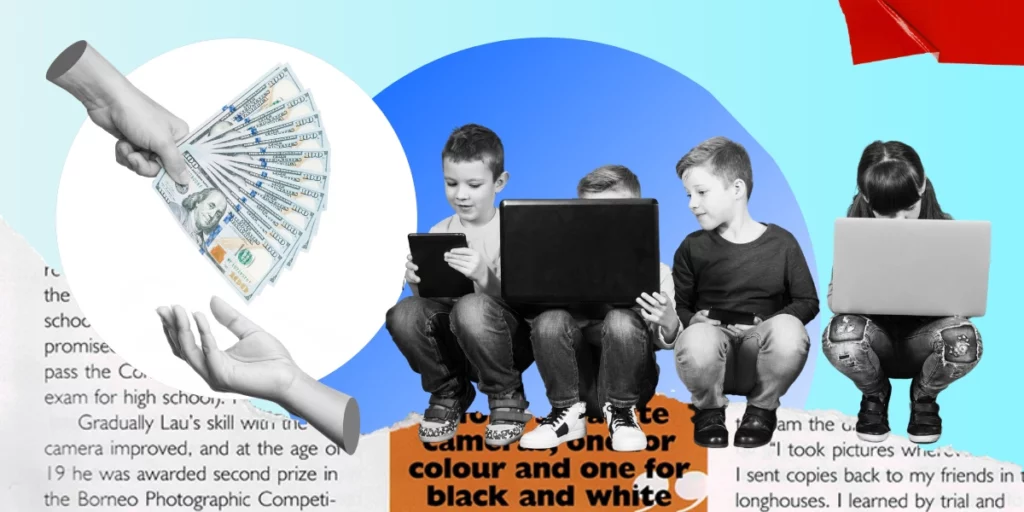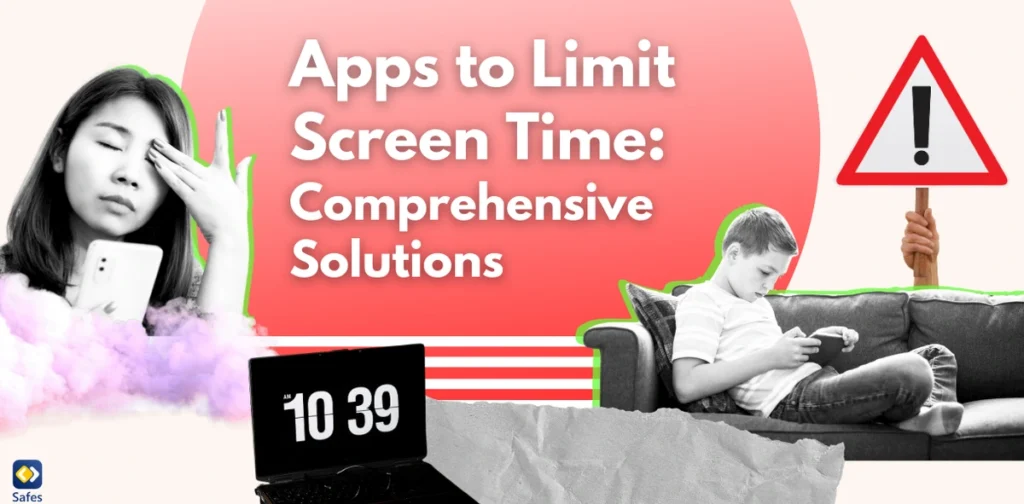You’ve probably heard of TikTok and Snapchat. But have you heard of Monkey? If your teen has, you might be wondering the same thing many parents ask: Is Monkey App safe?
Download and Start Your Free Trial of the Safes Parental Control App
Monkey is a video chat app that pairs users with random strangers. It is fast, social, and popular with teenagers. While it may seem like harmless fun, the reality behind the app can be unsettling for parents.
The platform lacks strong age verification and content moderation. For families trying to stay ahead of the latest online trends, this app introduces real concerns.
Here is a quick breakdown of what every parent should know before their child uses Monkey:
- Monkey App connects users through random video chats, often with no restrictions on who appears on screen.
- Age checks are weak or easily bypassed, which increases the risk of children interacting with adults.
- Reports of inappropriate behavior are common, including exposure to explicit content.
- App store reviews highlight frequent safety complaints, especially from concerned parents.
- Open conversations and digital guidelines are key to helping teens stay safe.
- Parental control tools may reduce risks, but supervision is still essential.
What Is the Monkey App and Why Are Teens Drawn to It?
The Monkey app was originally designed to replicate the experience of random video chats, similar to Omegle or Chatroulette. Users are paired for short video calls, and if both parties “like” the interaction, they can add each other and keep chatting. On the surface, it seems like a fun way to meet new people. For teens, especially, that sense of spontaneity and connection feels exciting.
What sets Monkey apart from other social platforms is its ability to quickly connect users and the minimal information required to get started. There is no in-depth sign-up process or meaningful age verification. With a few taps, users are in live video conversations with strangers from anywhere in the world.
For teens on the Monkey app, this thrill of the unknown is part of the appeal. But for parents, the idea of teens chatting with unmoderated strangers on video creates an obvious risk. Unlike curated social media apps where content is mostly shared among friends or followers, Monkey thrives on unpredictability. That unpredictability is exactly what makes it unsafe.
Understanding the app’s basic mechanics is the first step in making an informed decision about whether it belongs on your child’s device.

Is Monkey App Safe? The Core Risks to Know
Many parents ask the same question: Is Monkey App just a silly trend, or is it truly dangerous? While it may appear innocent at first glance, the reality is that Monkey is not designed with teen safety in mind. It prioritizes speed and novelty over security or moderation, which makes it a high-risk platform for young users.
One of the most serious concerns is the lack of effective screening. The app connects users instantly and has limited tools to prevent inappropriate behavior. Many parents have reported their children being exposed to offensive language, predatory users, or sexually explicit content.
This is not hypothetical. Reports of nudity on the Monkey app are frequent, and many of these encounters happen within the first few seconds of a call. Since the app relies heavily on user behavior with minimal enforcement, there is little protection in place.
Apps like Monkey do not come with built-in safety nets. For parents, this means the risks are real and immediate. Knowing these risks can help guide conversations with teens about what they may encounter online.
Monkey App: Key Safety Risks
| Risk Factor | Details |
| No strong age verification | Users can enter fake birthdates to access the app |
| Unfiltered video chat | Conversations begin without content screening or approval |
| High chance of explicit content | Reports of nudity and sexual behavior are common among user experiences |
| No reliable moderation | Offensive behavior is rarely caught or penalized in real time |
| Minimal reporting options | Users can report issues, but the response is slow or inconsistent |
What the Reviews Reveal
Before deciding whether an app is right for your child, it helps to hear from people who have actually used it. In the case of Monkey, the reviews paint a clear and consistent picture. The concerns are not isolated. They’re echoed across forums, app stores, and digital safety sites.
On Reddit, teens have described being exposed to explicit content within minutes of logging in. One user said they “kept passing people only interested in showing private parts.” Another explained that the platform is “full of perverts” and warned others to stay away.
Safety organizations have issued public warnings. According to Protect Young Eyes, a parent reported that her daughter was “inundated with sexual requests, mostly by men aged 19 to 29” within ten minutes of using the app. Experts from AVG and other watchdogs confirm that Monkey lacks age verification and content moderation.
A quick review of the Monkey app online makes it clear: the app is not built for safety. It may offer moments of fun, but the risks are significant and immediate.
Summary of User and Expert Feedback
| Source | Reported Issues |
| Reddit users | Predators, nudity, and harassment reported within minutes of use |
| Teens and trans users | Frequent exposure to sexually explicit content and unsafe interactions |
| Parents via Protect Young Eyes | Sexual requests from adults targeting minors almost immediately |
| Safety watchdogs (AVG, UK alerts) | Weak verification, no moderation, and repeated exposure to disturbing material |
Why Monitoring Monkey App Is So Hard for Parents
Even the most tech-savvy parents can find it difficult to monitor an app like Monkey. Unlike popular platforms with privacy settings and friend-based interactions, Monkey thrives on random, anonymous video chats. That makes it much harder to supervise or filter.
Teens can easily bypass age requirements by using a different birthdate during sign-up. Once inside, they can use the app without needing a username tied to a known email or phone number. The entire system is designed for speed and spontaneity, not traceability.
Another challenge is that Monkey doesn’t leave much of a digital trail. Unlike messaging apps where parents might review chat history, Monkey’s video calls vanish once they end. There is no transcript, no chat log, and no easy way to know who your child talked to or what was said.
Even if a teen deletes the app afterward, there’s no easy way to track what happened. This is where parental controls may help, especially those that allow for app usage monitoring, screen time restrictions, or app blocking entirely. While not perfect, they give parents a starting point in an otherwise invisible digital space.

Parental Safety Strategies That Actually Work
If your teen is using Monkey or apps like it, you are not powerless. Here are practical steps you can take to reduce the risks and open up communication.
- Start with a conversation: Ask your teen what they like about the app and what kind of people they talk to. Keep your tone open and curious rather than critical.
- Discuss digital boundaries: Explain the dangers of random video chats. Set clear expectations about what types of content and interactions are unacceptable.
- Encourage sharing without fear: Let your teen know they can tell you if something made them uncomfortable, even if they think they’ll get in trouble.
- Set phone or app limits: Use built-in device settings to limit usage during late hours or school time. Keep app access age-appropriate.
- Use parental control tools: Apps like Safes let you block dangerous apps, monitor new downloads, and get alerts about unusual activity.
Combining these approaches helps your child develop better digital habits while giving you tools to guide them safely.
Monkey vs Similar Apps
Apps like Monkey don’t exist in isolation. Other video chat platforms attract teens with the same promise of meeting new people. These apps vary in features, but many of the safety concerns are shared.
Understanding how Monkey compares to others like Omegle, Yubo, and Hoop helps you make informed decisions about what belongs on your child’s phone.
Below is a quick comparison of four popular social apps often used by teens:
| App | Random Video Chat | Age Verification | Content Moderation | Parental Controls Available |
| Monkey | Yes | Weak | Limited | No |
| Omegle | Yes | None | Very limited | No |
| Yubo | No (Live streaming) | Moderate | Moderate | Limited |
| Hoop | No (Profile swiping) | Weak | Some moderation | No |
While none of these apps were built with child safety as a priority, some offer more restrictions than others. If your teen is using any of these platforms, consider setting usage rules or using parental control tools that allow you to block apps, monitor installs, or set time limits.
Take Control With Safes Parental App
If you’re concerned about what your child might encounter on apps like Monkey, Safes can help you stay a step ahead. It’s a parental control app designed to give you real visibility and control, without constantly hovering over your teen’s shoulder.
Here’s what makes it stand out:
- App and web filtering: Block access to unsafe platforms, adult content, and custom sites. Get alerts if your child tries to bypass restrictions.
- Real-time app activity: See what apps your child is using, when they’re using them, and remotely block new downloads as needed.
- Cross-platform protection: Safes works on different platforms, so your controls stay consistent across all devices.
You can try Safes free today. Download Safes on Android and iOS. Sometimes, one good tool can make all the difference.
Conclusion
Raising teens in a digital world means navigating a stream of new apps, each with its own risks and unknowns. Monkey is one of those platforms that may seem harmless at first but carries real concerns for safety and privacy.
As a parent, you don’t need to know every detail about every app. But when an app encourages random video chats with strangers and lacks proper moderation, it’s worth taking seriously.
The best approach is a combination of open conversations, clear digital boundaries, and the right tools. It’s not about control for control’s sake. It’s about helping your teen explore the online world with greater awareness—and fewer risks.
Staying informed is your first step. Taking action is the next step.
Your Child’s Online Safety Starts Here
Every parent today needs a solution to manage screen time and keep their child safe online.
Without the right tools, digital risks and excessive screen time can impact children's well-being. Safes helps parents set healthy boundaries, monitor activity, and protect kids from online dangers—all with an easy-to-use app.
Take control of your child’s digital world. Learn more about Safes or download the app to start your free trial today!
